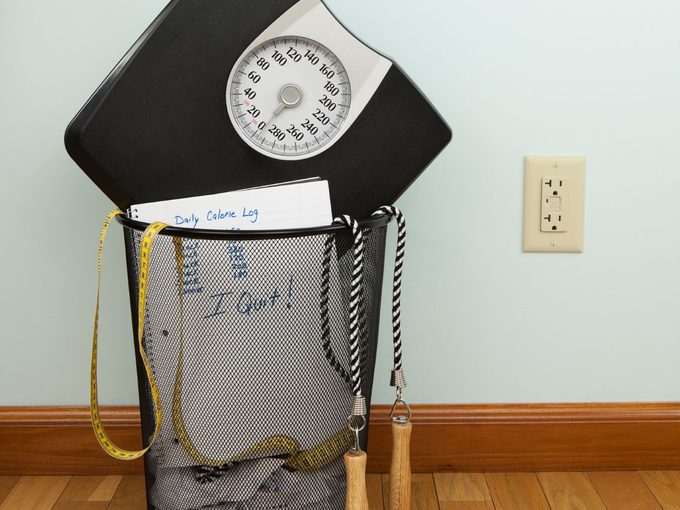Why Is It So Hard To Lose Weight?
A new study suggests that it may be nearly impossible to lose weight, and keep it off

When you first set out to lose weight, the task can feel nearly impossible. Now, new research suggests that feeling may be spot on. According to a study released last week in the American Journal of Public Health, an obese woman has a one in 124 chance of losing weight each year (the probability for men was 1 in 210).
U.K. researchers analyzed nine years worth of health records from almost 100,000 obese women and 77,000 obese men over the age of 20. The result: just over two percent of women and under two percent of men attained what’s considered ‘normal’ body weight.
‘The probability of attaining normal weight or maintaining weight loss is low,’ the researchers conclude in their study, adding that the more a person weighs, the lower their chance of losing weight. The study couldn’t determine whether the patients were trying to lose weight or what methods they used, but one of the study’s authors said in a statement that strategies focusing mainly on cutting calories and physical activity aren’t doing enough to help people lose weight and keep it off.
In Canada, the numbers aren’t much better. According to a survey by the Heart and Stroke Foundation, 70 percent of obese participants regained all or even more of the weight they’d previously tried to lose.
The U.K. researchers concluded that public health initiatives (think: food guides and a recommended 30 minutes of exercise per day) might not be effective in helping people lose weight. Looking at the way we discuss dieting and weight in popular culture, our attitudes toward body image may also need an overhaul.
When our society still puts skinny on a pedestal, it’s tough not to fall for quick-fix diets. We’re impatient; we want to wear what Kendall and Kylie wear; we want to see the numbers on the scale drop fast and furious. But the reality is that weight loss is a slow process that takes commitment and focus. And you have to be ready to do it. A healthy and realistic weight loss goal is one to two pounds a week, according to the Mayo Clinic. To do that, you have to burn 500 to 1,000 calories more than you consume each day. Expecting to drop a lot of weight quickly will only set you up for disappointment.
Another weight-loss hurdle: the idea that only slim people exercise and overweight people can’t or shouldn’t. Research shows that 72 percent of images featured with news stories about obesity are stigmatizing. Recently the U.S. magazine Women’s Running broke those stereotypes by putting runner and plus-size model Erica Schenk on their August 2015 cover. ‘Some women believe that since they have curves they can’t run or shouldn’t run,’ Schenk told the magazine. ‘Running is for every body anytime.’
When it comes to losing weight, the equation can seem deceptively simple: burn more fuel than you eat. But dropping pounds is about so much more than calories in and out ‘ it’s a lifestyle shift that starts with healthier eating and finding a way to make exercise a habit, like brushing your teeth. And all that starts by having compassion for yourself and bodies of all size. It’s difficult for sure, but you know what they say: nothing’s impossible.




